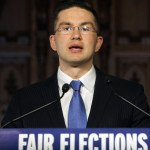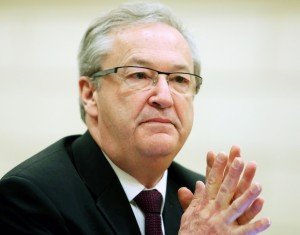Unfair Elections Act, The
The first and main thing to note about PM Stephen Harper’s proposed Fair Elections Act is that everybody who knows anything about elections thinks that it’s unfair.
As Leonardo di Caprio says in The Wolf of Wall Street about some scam he’s just about to tell us about, “You really don’t want to know the details.” Same thing for the so-called Fair Electons Act, the Conservative government’s massive 242-page package introduced to Parliament last February by Democratic Reforms minister Pierre Poilievre, a politician described by a fair-minded conservative columnist as “among the most ruthlessly partisan ministers in a government filled with ruthless partisans.” (Andrew Coyne, “The Tories were right to be nervous,” National Post, Mar. 7, 2014.)
The main points of the proposed law are 1) it makes it harder for people to vote by demanding more stringent voter ID; 2) it reduces the power of the independent Chief Electoral Officer Marc Mayrand; 3) it may prohibit Elections Canada even from encouraging voters to vote; 4) it allows political parties and partisans to spend even more money than they do now; and 5) it does nothing to fix the gaping holes in the net that caused the “Robocalls scandal” of a couple of years ago, whereby some Tory operatives attempted to trick voters into voting for them.
To add insult to injury, minister Poilievre said that the bill would ensure that the referee of fair elections — a reference to Chief Electoral Officer Mayrand or the Commissioner of Elections Canada, the independent officer who investigates allegations of wrongdoing — “not wear a team jersey,” implying that Elections Canada was biased and playing favourites.
The inept hockey metaphor brought Mayrand into the rink. In what were described by the press as “uncharacteristically frank remarks,” the Chief Electoral Officer lashed out at the government, saying the proposed law would completely “take the referee off the ice” and could make it harder for some citizens to cast ballots, especially marginalized voters, such as the poor, the elderly, young people, and certain ethnic groups.
“The only jersey I think I’m wearing, if we have to carry the analogy,” said Mayrand, with evident distaste, “I believe is the one with the white and black stripes.”
Although the government tried to stickhandle the bill through Parliament in stealth mode, the opposition forced some committee discussion of the proposal, as well as testimony from Mayrand, who, according to columnist Coyne, “simply shredded [the bill], almost line for line, proposing more than two dozen amendments that woud effectively rewrite the bill.” By the time he was done, said Coyne, “very little of the Act was left standing.”
Nonetheless, Harper dot.gov still controls the arena, owns the richest team, sells the programs, and is intent on stealing the puck from the Hab-Nots. (The Dictionary unreservedly apologises for the final pun.)

